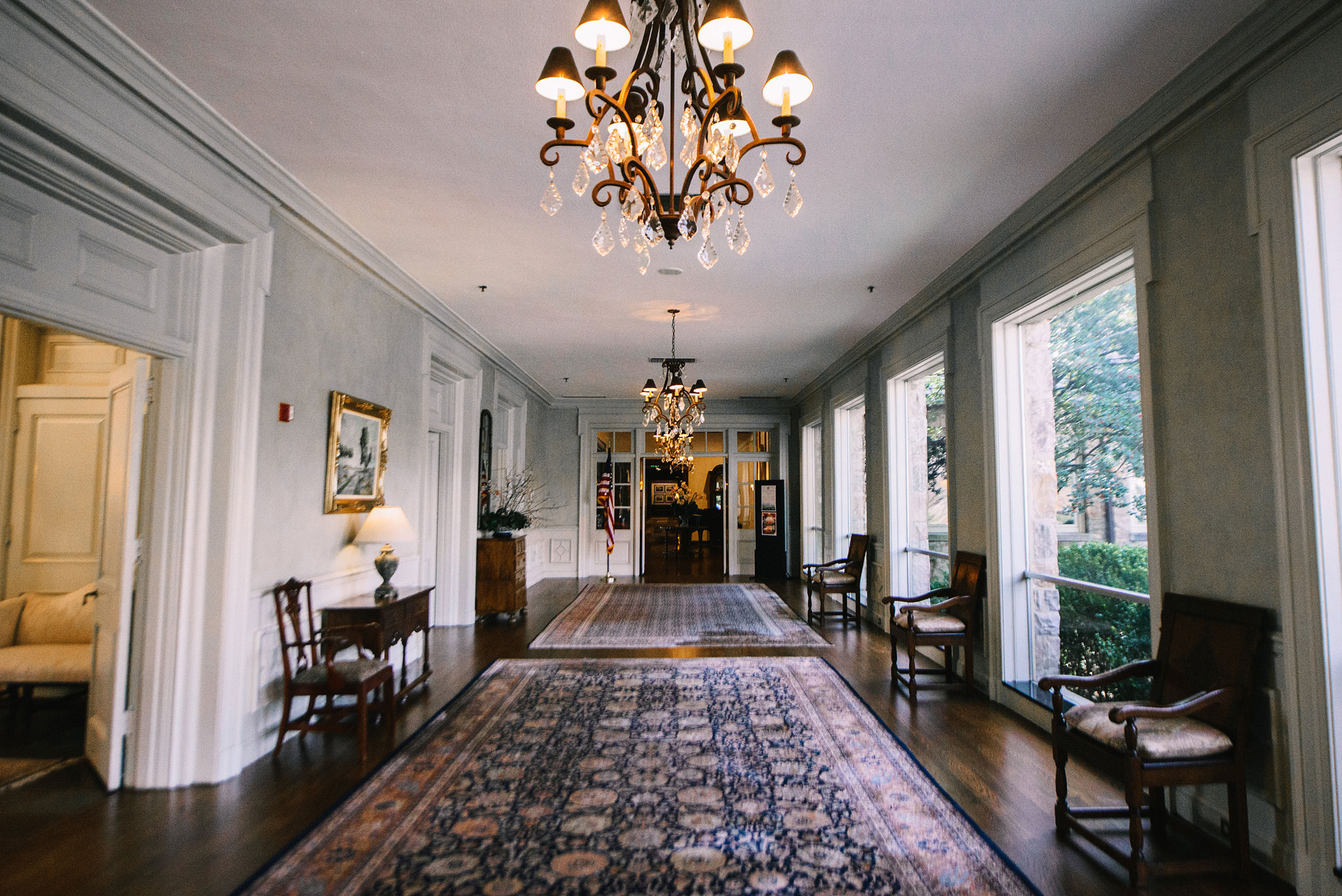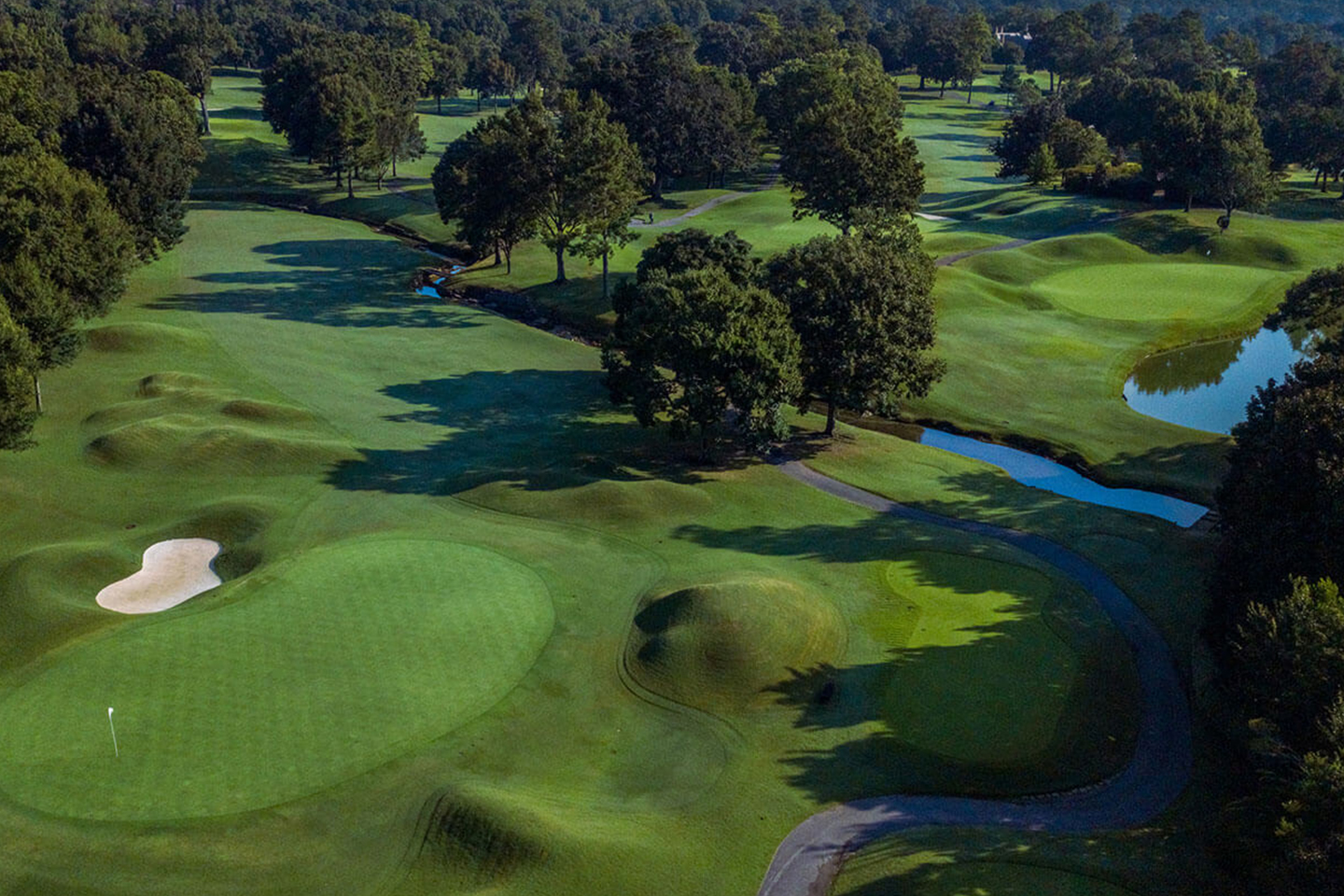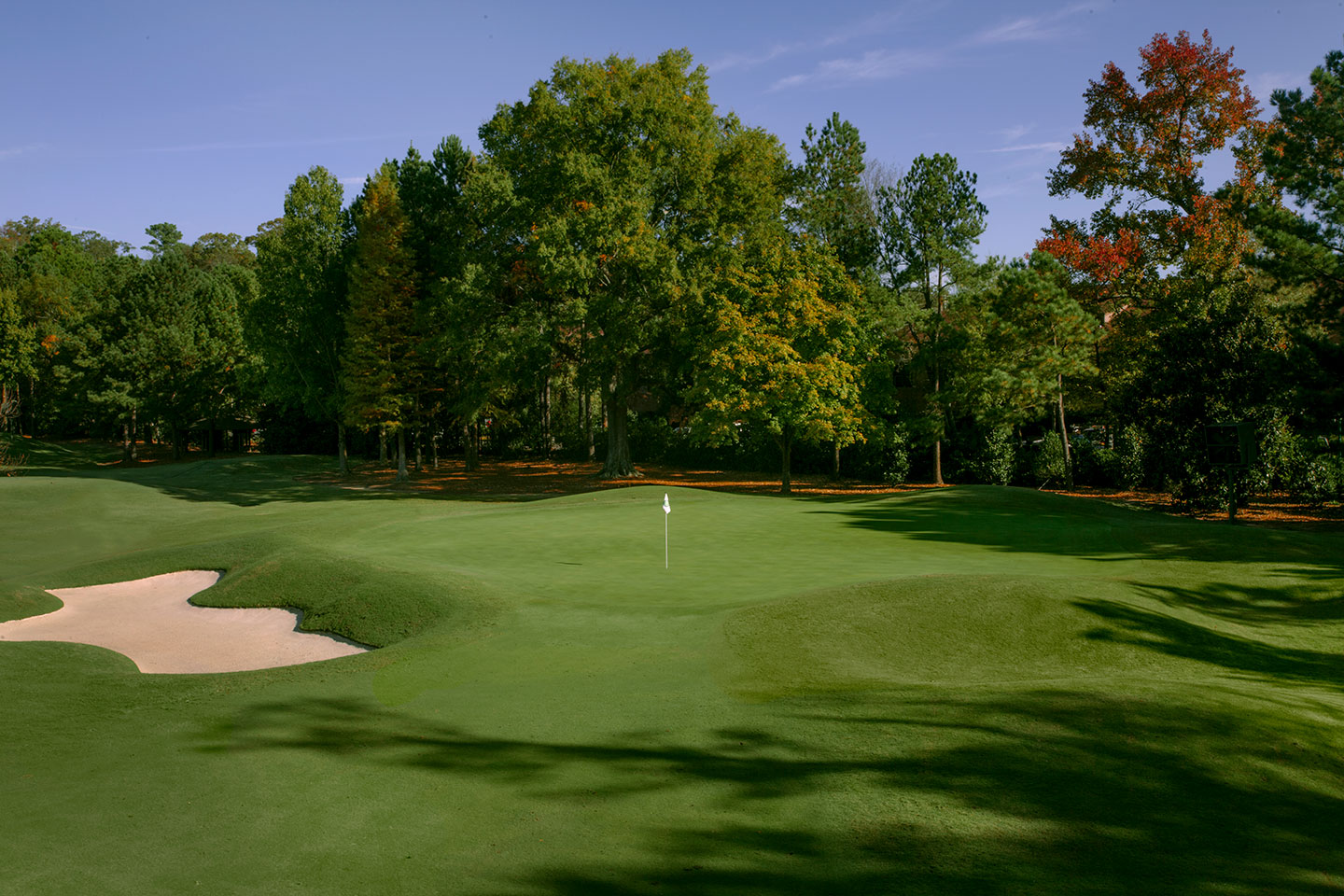| 1898 |
By September 26, 1898, 27 prominent Birmingham men had signed the roll establishing the Country Club, adopted a constitution and bylaws, and elected officers. They established a social club first to show off their prized horses and shiny rigs, which became a popular place for "social and literary advancement" and for "various forms of innocent indoor and outdoor sport, amusement, exercise and recreation."
 |
|
|
 |
| 2016 USGA Men's State Team Championship |
|
|
 |
| 2022 U.S. Amateur Four-Ball |
The 7th U.S. Amateur Four-Ball Championship was hosted on the East and West Courses from May 14-18. The Country Club of Birmingham welcomed 128 two-player teams for two rounds of Stroke Play and five rounds of Match Play. North Carolina's Chad Wilfong and Davis Womble took the title after 19 holes of play.
For more information on the U.S. Amateur Four-Ball Championship, visit the USGA website.
 |
|
|
 |
|
|
 |
| About The Country Club of Birmingham |
Home to two outstanding golf courses, The Country Club of Birmingham is synonymous with the sport. In addition to extraordinary golfing, CCB features state-of-the-art Aquatics, Fitness, and Tennis facilities and world-class dining and social experiences.
It is also an ongoing work of architectural and interior design excellence that blends the best of historical precedent with a quiet elegance and refined style. Such a place does not just happen but evolves. In the case of the Club, that includes three homes over the years - the original north Birmingham driving club site, a new location in 1904 in the Lakeview area, and finally its home in Mountain Brook, where it is enjoyed today. |
| Learn About Our History | |
|
 |
| East Course |
The East Course, designed by the legendary Donald Ross, has remained true to its roots. While more benign in its look than its counterpart, the course will challenge competitors to beat, or even meet, their scores from the West.
Explore the course
|
|
|
 |
|
|
 |
| Golf Courses |
| West Course
The West Course, a result of the blended talents of three World Golf Hall of Fame architects, Donald Ross, Robert Trent Jones, Sr. and Pete Dye, provides historic, inspiring holes. It has hosted many state, regional, and national events.
Explore the course |
|
|
 |
| Guest Information |
The Country Club of Birmingham is a place of comfort, friendship, and family. Visiting the Club is an unparalleled experience, and we are pleased to welcome Guests from all over for golf tournaments, family visits, and more.
 |
| Learn More | |
|
 |
| Guest Information |
The Country Club of Birmingham is a place of comfort, friendship, and family. Visiting the Club is an unparalleled experience, and we are pleased to welcome Guests from all over for golf tournaments, family visits, and more.
 |
| Learn More | |
|
 |
| History Overview |
| The Country Club of Birmingham was founded October 1, 1898, in North Birmingham as an exclusive driving club "with means and facilities for various forms of innocent indoor and outdoor sports, amusements, exercise, and recreation." In 1904, the Country Club moved to the Lakeview resort area at the end of Highland Avenue. In 1926, it moved onto farmland in Shades Valley where 36 holes of golf, designed by the famous architect Donald Ross, and a swimming pool were built. The original English Tudor-style Clubhouse designed by Warren, Knight, & Davis, was completed in 1927.
A major part of the history of The Country Club of Birmingham centers around golf. The West Course, designed by Donald Ross, was converted by Robert Trent Jones to large greens trapped by signature bunkers and lakes, and revised again by Pete Dye. Over the decades, CCB has grown with its members to include aquatic, fitness, family, and racquet sports facilities, while maintaining a focus on unparalleled dining and recreational experiences for all.
What a mixture, what a history. |
|
|
 |
|
|
 |
| The Country Club of Birmingham |
Founded in 1898, The Country Club of Birmingham offers superior social and recreational services to its members and their families.
Home to two outstanding golf courses, The Country Club of Birmingham is synonymous with the sport. In addition to extraordinary golfing, CCB features state-of-the-art Aquatics, Fitness, and Racquet Sports facilities and world-class dining and social experiences. |
|
|
 |
| USGA Tournaments |
The Country Club of Birmingham is one of the few clubs to have hosted multiple United States Golf Association national championships within a single decade.
CCB was selected to host the 2013 U.S. Mid-Amateur Championship, and shortly after in 2016, welcomed amateur golfers from all over the country for the Men's State Team Championship. We were delighted to host the 2022 U.S. Amateur Four-Ball Championship in May 2022.
The Country Club of Birmingham has long been dedicated to developing amateur golfers and promoting the USGA. We look forward to a continued relationship in the many years to come. |
|
|
 |
| West Course |
The West Course, a result of the blended talents of three World Golf Hall of Fame architects, Donald Ross, Robert Trent Jones, Sr. and Pete Dye, provides historic, inspiring holes. It has hosted many state, regional, and national events.
Explore the CourseView ScorecardVideo Tour
 |
|
|
 |
|
|
 |
| West Course |
The West Course, a result of the blended talents of three World Golf Hall of Fame architects, Donald Ross, Robert Trent Jones, Sr. and Pete Dye, provides historic, inspiring holes. It has hosted many state, regional, and national events.
Explore the CourseView ScorecardVideo Tour
 |
|
|
 |
| 2013 U.S. Mid-Amateur Championship |
|
|
 |
| East Course |
The East Course, designed by the legendary Donald Ross, has remained true to its roots. While more benign in its look than its counterpart, the course will challenge competitors to beat, or even meet, their scores from the West.
Explore the CourseView Scorecard
 |
|
|
 |
| 1900s |
From the beginning and for two following years, Henry Key Milner was president of the Club and helped select the club location � near the end of the trolly line, a city park, and natural springs. An engineer who laid out Key Circle & Milner Heights in Redmont, he oversaw the building of the one story clubhouse, surrounding veranda and a square ballroom with two large fireplaces at the original North Birmingham location, which remained the Country Club from 1898-1904.
 |
|
|
 |
| 1910s |
The first Women's Southern Golf Association Invitational four-day tournament was held at the Club on Highland Avenue in 1915. Club professional Charley Hall explained the use of the seven clubs most women carried while wearing large hats and ankle length dresses and continued on with dinner dances and parties all night.
 |
|
|
 |
| 1920s |
Donald J. Ross, noted architect, designed both the East and West courses � an unusual treasure to have 36 holes at one club. The architectural firm of Warren, Knight, & Davis created the Tudor style clubhouse, which opened in 1927, completing the vision of President Dr A. B. "Buck" Harris.
 |
|
|
 |
| 1930s |
President "Pap" Gresham, who also served as treasurer for several decades, saved the Club during the Great Depression in many ways. He arranged several successful parties, such as the "Hard Times" Party and a Gay Nineties Ball celebrating the Club's 32nd Anniversary, where Governor Bibb Graves was an honored guest with his wife.
 |
|
|
 |
| 1940s |
Dixon Brooke brought the Club its first national golf championship with his NCAA victory in 1940. Sam Perry was the Southern Amateur Champion in 1929, 1932, & 1941, as well as the 4-time State winner before his untimely death in World War II. The Alabama State sterling Revere bowl was named the Sam D. Perry Memorial Bowl in his honor.
 |
|
|
 |
| 1950s |
The Club's leading tennis titleholders were Wade Herren, a 4-time Alabama State Champion, Southern Champion, and three-time Southeastern winner; Jean Clarke, a victorious competitor 2-times in the Alabama State tournaments, 8-times in the Southern, and who was ranked nationally and competed at Wimbledon.
 |
|
|
 |
| 1960s |
Sprott Long was the designer of the West Lounge addition with its beamed pitched roof and large surrounding windows and the Terrace Lounge where the Club's stone exterior wall became the Terrace Lounge's interior structure. Golf architect George W. Cobb enlarged the East Course greens in his renovation, and the West Course was reopened after the greens returned from an accidental poisoning.
 |
|
|
 |
| 1970s |
Club past president and USGA Executive Committee treasurer Elbert Jemsion, Jr. met with President Ford and Arnold Palmer on the possibility of establishing the USGA Associates Program to help connect a nation of golfers to the USGA. Today, the program has around 700,000 members, and Jemison received the Ike Grainer Award twice for his service to the Association.
 |
|
|
 |
| 1980s |
CCB had always had a ballroom, and the Shades Valley location received one in 1979. The project was completed just in time for large wedding receptions, the Krewe Ball, fashion shows, and other major celebrations, like Hubert Green's 1985 PGA victory event.
 |
|
|
 |
| 1990s |
The devastation of the 1991 Good Friday storm totaled the club cart barn, fell over 860 trees on the courses, and damaged the clubhouse and tennis fencing.
Meanwhile, juniors were victorious with Patrick Sweeney ranked top in the South in 1993, captain of the Princeton Tennis Team, and a summer coach at the CCB; Parker Goyer #1 in the State in 1994, 1996 and 1997; and Brock MacKay, a 4-time State champion.
In 1998, the Club celebrated its centennial anniversary.
 |
|
|
 |
| 2000s |
Following up on his 1984 renovation of the West Course, legendary course designer Pete Dye began a series of return trips to Birmingham in the late 2000s, working with his CCB team from the prior work -- Miller Gorrie, Barney Lanier, Head Superintendent Lee McLemore, and others. With a goal of regrassing the entire West Course, as well as making improvements in irrigation and water storage and efficiency, the effort assured the West Course retained its status as one of the South's premier courses. Dye was ultimately elected an Honorary Member of our Club. Rives Construction simultaneously completed work on the new Tennis Facility, settled between 14 and 15 West. The new facility features 14 courts, as well as a pro shop and locker rooms.
 |
|
|
 |
| 2010s |
As our legacy as a great club with great golf continued, CCB undertook a significant update of the East Couse led by John LaFoy, architect, of Greenville, South Carolina. Plans included entirely new irrigation system, a massive lake off the 11th Tee, an expanded and enhanced Practice area, and a digital, state-of-of the-art Teaching Facility. Greens were reinvigorated with deep aerification, and bunkers completely rebuilt improving playability and saving on maintenance time and costs. Additions to The West Lounge resulted in more dining spaces, including Twenty Twelve and terrace seating.
 |
|
|
 |
| 2020s |
2020 brought the completion of a newly redesigned swimming pool and expanded Terrace and a very popular casual dining experience at Milner's, along with expanded spin and multipurpose classrooms for the Fitness Facility. Coinciding with the arrival of the pandemic, these new additions and heightened participation in golf and tennis allowed CCB to serve as a place of respite and well-being in a time of uncertainty.
 |
|
|
 |
|